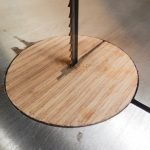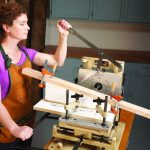We may receive a commission when you use our affiliate links. However, this does not impact our recommendations.
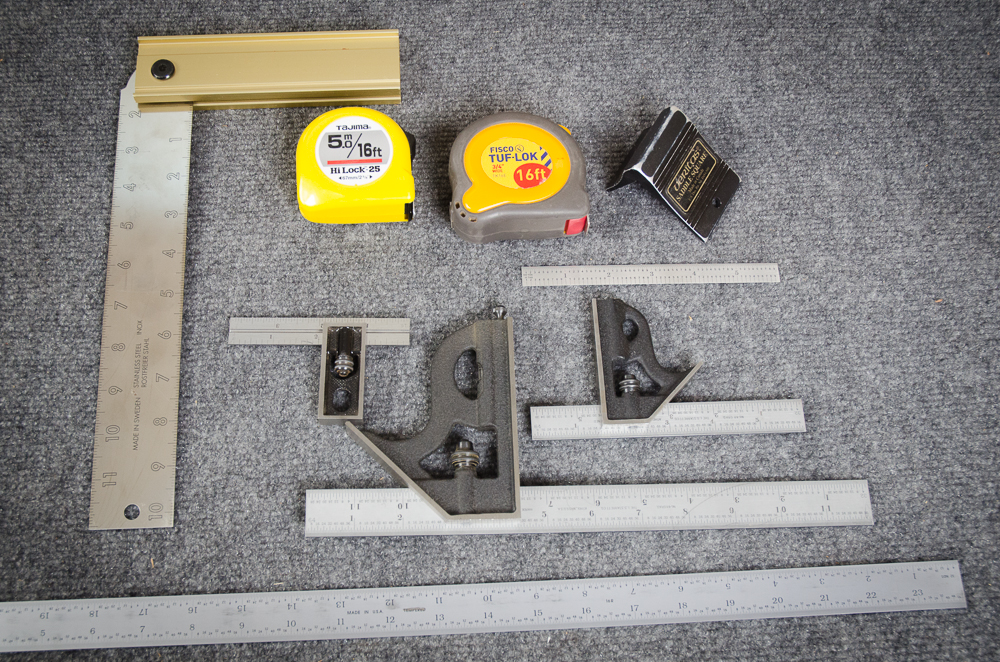
Hand tool woodworkers can get by with a minimum of tools. But, no matter what kind of woodworking you do, starting and sticking with precision instruments makes life in your shop much easier. The best place to start? A high-quality 12″ combination square, like the Starrett in the center.
In this series, I’ve covered tools for standardization, tools for measuring and tools for precision. Now, it’s time to bring it all together with a few recommendations for different kinds of woodworking.
How much accuracy you need depends on the kind of woodworking that you do. Remember that for hundreds of years, woodworkers got away with few or no measuring tools, yet still produced amazingly accurate work. How? It’s because they relied on other tools like story sticks, setup pieces, and patterns and used them repeatedly and wisely. Using standards or story sticks is still a great method for producing accurate work and avoiding mistakes. But, some kind of measurement is where all modern projects start. The secret of accuracy is starting with high precision and sticking with it all the way through.
Once you cross the line of producing more than one of something in your shop — say four legs for a stool, a run of six dining chairs or four mirrors for gifts, you’ll depend even more on your measuring instruments. To avoid measuring mistakes caused by using more than one measuring device — whether it’s a ruler plus a measuring tape, all your measuring tools have to agree. The way to do that is to have a set of high-quality measuring tools to you use as reference standards to test all the other measuring tools in your shop against.
The hand tool focused woodworker
- Starrett or PEC Tools 12” and 6” Combination Squares
- Starrett or PEC Tools 18, 24 or 36” rules
- Tajima 16’ Tape Measure, or Fisco Class I Tapes
- 8” to 12” accurate try square. Nobex folding models are personal favorites
- Extra: Veritas Saddle Square. In my apron.
With a focus on hand tools, the measuring tools you need can be minimal, but there’s still a need for precision. A high-quality combination square, such as a 12” Starrett will cost from $100 -$130 depending on finish choices, is a lifetime tool and an investment in quality woodworking. Besides being accurate, it’s a rugged tool that will last. A tool of this caliber is not just a ruler and adjustable square, it’s also your shop standard for testing all your other measuring tools and setting up your fixed power tools. I bought mine in 1997 and it’s still going strong. I use the smaller version —the Starrett 6” combination square all day long and keep it handy in my shop apron. Some woodworkers prefer the smaller 4” Starrett double square. PEC Tools is a good lower cost alternative for combination squares.
It’s always good to have at least one very accurate ruler around. Don’t assume that the cheap ruler you bought at a home center is accurate. Placed next to a Starrett, you’ll be shocked at the difference. Ruler size depends on your needs. I have rules ranging from 6” to 72” in my shop and use them all, but the ones I use most often are 6”, 12” and 24” long. A small 6” stainless model that won’t bend that easily fits in a pencil pocket in a shop apron is very handy. If you have a 12” combination square, you’ve got a great 12” ruler right there. When it comes to longer rules, an 18″ – 36” Starrett or PEC Tools are first on my list. Pro tip: Thick, high-quality rules are expensive. If you’re on a tight budget, look for used or cosmetic blems online.
For tapes, refer to my earlier post on testing each tape before you buy. It’s important that every tape in your shop matches your precision rules, otherwise, mistakes will happen. Size and format of tape measures depend on your needs and preferences. As a furniture maker, I’ve found a 16’ x 3/4” is small enough in bulk to not be a burden, but long enough in length to check any hardwood lumber I purchase from a supplier. After more than a decade of looking for the best tape measures, I’ve become a big fan of Tajima tape measures. Consistent quality and high accuracy are Tajima trademarks. I use the 1” wide x 16’/5M model because for current work, I need imperial/metric combination tape. They make several other models that are sure to fit your needs.
For try squares, many woodworkers like the brass and wood models you see at woodworking stores. Those are beautiful and great to use. Just make sure you test any square you buy for squareness against your standard Starrett, or other trusted combination square. Though I got lucky with my first cheap square purchased over 20 years ago, I have yet to have a student show up a class with an accurate famous brand square purchased from a home center. Like tape measures, always test before you buy. I bought a folding Swedish Nobex folding model years ago on a whim and they’ve become my daily choice.
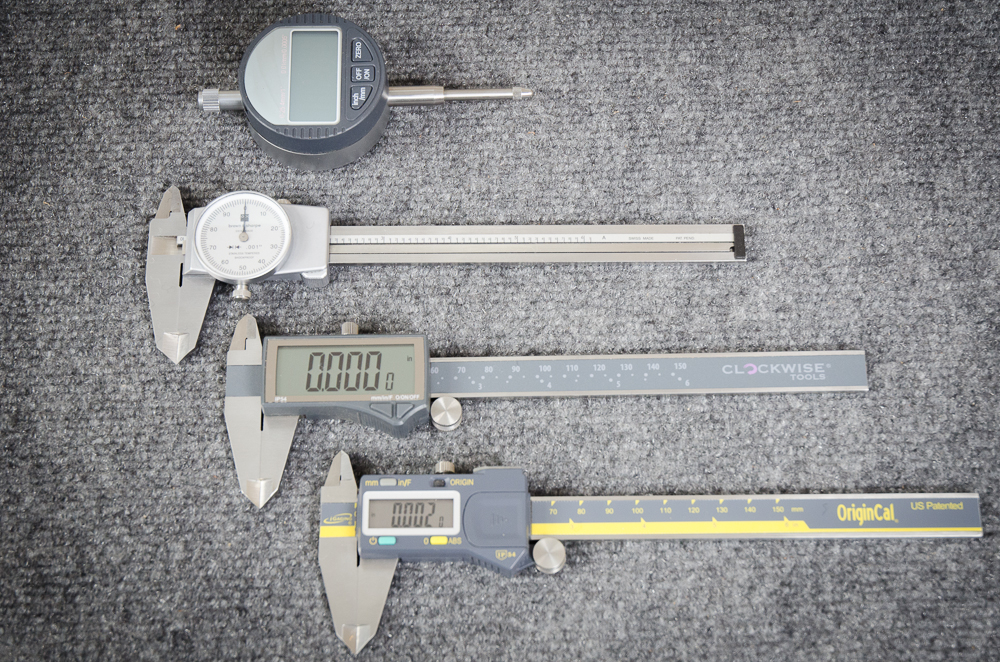
Calipers are essential for fine-tuning cuts, joinery, and measuring the thickness of wood. Digital or dial indicators are used for setting up and tuning table saws, planers, jointers, and sanders.
The Hybrid Woodworker
All of the above tools for hand tool woodworking, plus…
- Clockwise or iGauging 6” digital caliper or Mitutoyo or Brown and Sharpe dial caliper
- 0” – 1” Dial or digital Indicator and holders
- Extras: Digital height, angle gauges and protractors
Everything recommended for the hand tool woodworker applies with the additions of a quality digital or dial caliper and a dial indicator. Calipers are the only way to accurately measure board thicknesses as they come out of a planer or for checking widths when ripping boards on a table saw. They are also great for fine-tuning mortise and tenons. In terms of brands, the big names are Mitutoyo and Brown and Sharpe are consistently excellent, but I’ve found the latest digital models from Clockwise and iGauging to be just as accurate, well made and less expensive. And, like the famous brands, each instrument is individually tested for accuracy.
If you prefer dial calipers, Mitutoyo and Brown and Sharpe are superb. Look for well cared for used ones on eBay if you’re on a budget. Easy to find digital calipers at local home improvement stores are Husky brand 6” calipers with a lifetime warranty. I do not recommend the cheap digital calipers that you can find at tool discount stores. They consume batteries at a startling pace and I’ve had over a dozen die. It’s smarter and cheaper in the long run to buy a quality caliper you’ll use for years, to begin with.
I’ve also made great use of digital height gauges for setting up a table saw and router table cuts. These are finally inexpensive and save a lot of time when fine-tuning a cut or router table setup. Also, the digital angle gauges or protractors really help when it comes to finding or fine-tuning an angle cut.
Being a machine user, you also need to setup all your woodworking machines and measuring scales for accuracy. Often, a dial indicator and stand, magnetic holder or miter slot holder are the best tools to set up your fixed tools. Decent ones are not very expensive. A dial indicator and magnetic base, combined with calipers can help fine tuning table saw cuts, planer and sander thickness and tuning mortise and tenon joints.
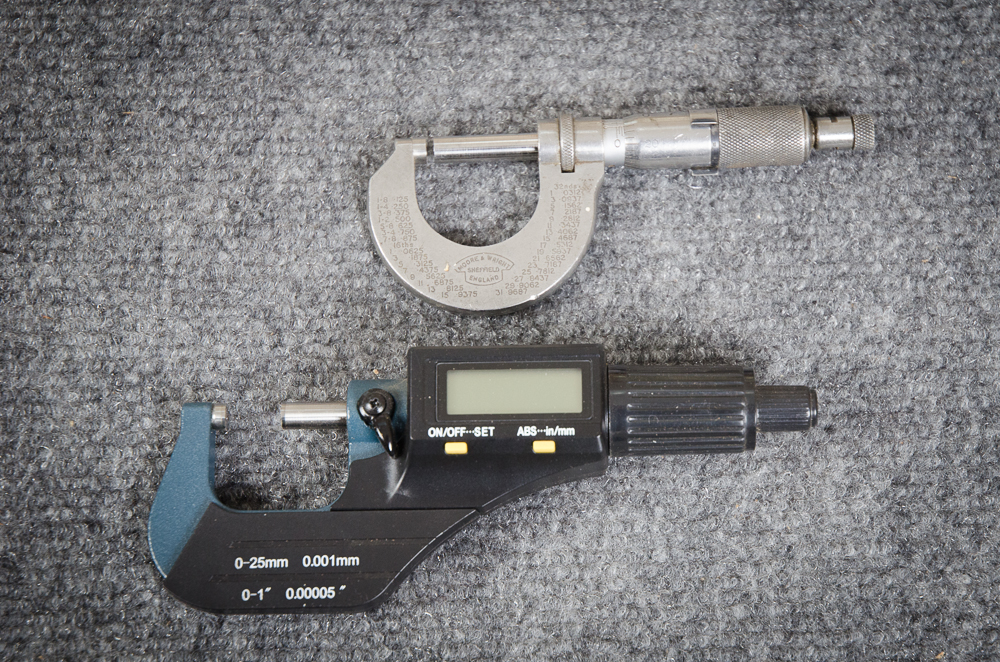
High precision instruments like micrometers are handy for measuring mils and bits used in CNC work
The Digital/Hybrid Woodworker
All of the above tools for hand tool woodworking, and hybrid woodworking, plus…
- iGaging 0”-.5” digital micrometer or classic analog micrometer
A micrometer is for high precision. This tool is mostly used for checking diameters of bits and mills used on a CNC. Since a CNC runs on tool paths defined by very precise CAM software, the actual size of your mills can matter. Though I’ve had a small analog micrometer most of my adult life, I happily switched to the latest digital micrometers when they became affordable. Accurate to .00005”, they’re more than good enough for any kind of machining of wood or metal you’re likely to ever do. I like the absolute origin models because they remember your last setting. Just to remember to turn them off when you’re not using them. None of the absolute origin style calipers or micrometers I’ve used have auto shut off.
Personal choices. Lifetime use.
Measuring tool choices are very much like the choices you make for hand tools. Everyone has their own preferences. I prefer that all my instruments to be high precision, rugged measuring tools that I can rely on day-in and day-out for many years. And, through high-quality standard reference instruments and regular testing, all my measuring tools agree so I can trust whichever tool I have in my hand at the time. Think of precision measuring instruments like universal ‘story sticks’ only better, because they all match up. Hopefully, some of the choices I’ve made will help you build your own collection of precision instruments for woodworking.
Additional Resources
- All posts on Precision Instruments, click here
- Digital Woodworking on Instagram
- Personal Work on Instagram
- Digital Woodworking YouTube Channel
Here are some supplies and tools we find essential in our everyday work around the shop. We may receive a commission from sales referred by our links; however, we have carefully selected these products for their usefulness and quality.








